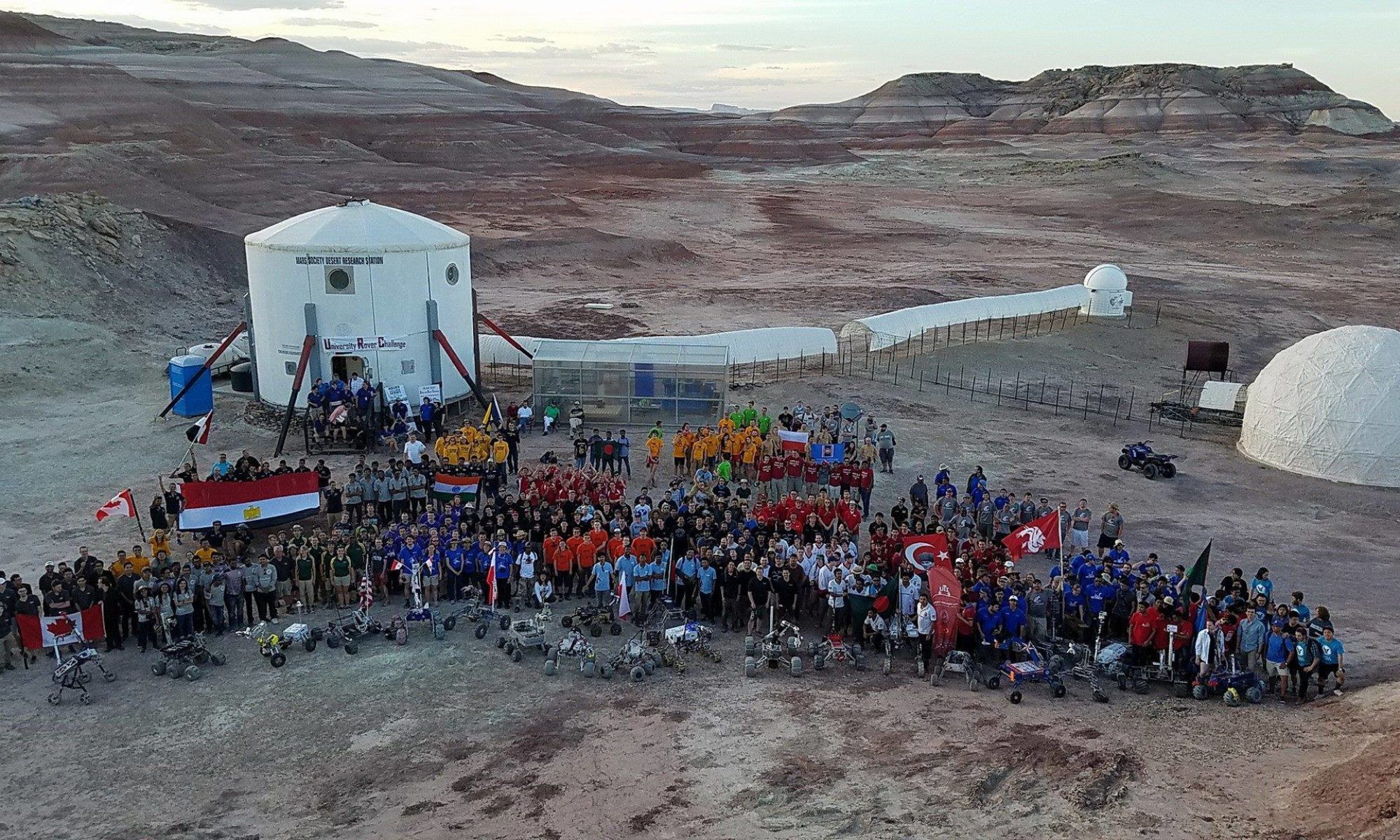THE SOUNDS OF MARS
Lindsay Rutter
Commander, Crew 228
Sounds on Mars, punctuated with Japanese onomatopoeia.
Disclaimer: The sequence of events has been modified for creative purposes.
========== Verse One ==========
"You hear that? That whistling sound? Whoooooo," one asked.
"That sure is weird music," the other replied.
On the dark side of the Moon, Apollo 10 astronauts Eugene Cernan and
John Young describe its hauntingly beautiful melody. But the Moon
should have no sound – there is no sound medium. Turns out the
mysterious music was only VHF radio interference between the Command
Module and the Lunar Module. The public hears the eerie sounds decades
later.
We suit up for our first EVA. A muffled buzzing comes from our air
supply. [ぶんぶん Buuuun Buuuun]. It echoes in our space helmets. Will we
hear much of Mars beyond this purring?
Standing in the airlock, the five minute countdown initiates. Our
emotions well up into what almost feels like a sound.
[わくわく Waku Waku].
That is the sound of anticipation in Japanese. In English,
onomatopoeia is restricted to physical sounds. But in Japanese,
onomatopoeia extends past this physical limitation. Our emotions, our
sensations, our motions, our appearance, how we experience nature –
all of these conditions have sound symbolism in Japanese.
We step onto the landscape and squint our eyes at the dizzying
splendor. The Sun blazes its sweltering song. [ぎらぎら Gira Gira]. Jin
and I depart on our rovers, Perseverance and Curiosity. We hear a
raspy track from the gravel below. [凸凹 Deko Boko].
Percy is determined to detect life, meticulously caching rock samples.
They say the tune a rock hums when Percy’s laser strikes it is what
allows us to infer mass and relative hardness. Today, Jin and I join
Percy in her passion project. Our target destination is Jotunheim,
Homeland of the Gods. The inverted river channel is believed to
contain potential biochemistry of interest and our mission is to
confirm this hypothesis.
We traverse the dangerous terrain at the speed of sound. The sound of
a snail’s pace, that is. [のろのろ Noro Noro].
"Slow is smooth and smooth is fast," Jin says.
Disembarking at a predetermined location near Jotunheim, we contact HABCOM.
"EVA to HABCOM. We arrived at the junction. We will now circumnavigate
the feature by foot. Expect a radio blackout. We will reestablish
connection by 0945."
"HABCOM to EVA. Contact by 0945. Copy that."
We head to Jotunheim by foot. The vermillion regolith sighs hoarsely
as we walk on it. [さくさく Saku Saku].
A smoky mint-green sand is exposed beneath. The elevated remains of
the ancient river come into view. My head sweeps across the field from
left to right, a stunning panorama. Variegated mesas and stately
buttes pepper the landscape. We begin collecting samples from the
precipitous slopes of Jotunheim. The steepness proves hard to
navigate, and I stagger backward, with my heavy spacesuit exacerbating
my descent.
I stomp down the slopes until I regain my balance. [ドドドドド Do Do Do Do Do]!
My heartbeat percusses in my ears. [ドキドキ Doki Doki]!
A fall in this harsh world, and I would become one with the dusty landscape.
"Slow is smooth and smooth is fast," a concerned Jin reminds me.
We finish our sample collection. 0938. Seven minutes remain. We walk
back to our rovers, and hear the splashy chimes of precipitation.
[ぽたぽた Pota Pota].
"EVA to HABCOM. We have sampled Jotunheim. We will continue Northward
to examine the raised sea-green dome structure. Do you copy?"
"HABCOM to EVA. We have precipitation. You are not authorized to
continue the EVA." Our radios warble with static. [ざーざー Zaa Zaa].
Did they say we ARE authorized or we ARE NOT authorized? One word sure
can make a difference! Even Neil Armstrong confided his infamous line
was recorded in the history books with one word missing.
I am pretty sure they said we ARE authorized. But sometimes we hear
what we want to hear!
"I repeat. You are NOT authorized to continue the EVA. Please return
to the HAB immediately."
It was clear. Even the pink noise of the static could not conceal it.
"Okay. This is the saddest moment of my life," I say, duplicating the
50-year-old words Ed White muttered, when he did not want to return
from his spacewalk.
We return to the HAB without incident.
========== Verse Two ==========
Back in the ScienceDome, I attempt to extract DNA from the samples.
Bead-beating. Eluting. Vortexing. I pipette the liquified regolith
into tubes the size of my pinky. I line them up in a microtube rack.
"Hey, they look like tiny chocolate milkshakes in little cupholders!"
I say to Jin.
"Can I try one?" Jin asks, hopefully jokingly.
He stands to my right, but his voice arrives at my left. My head
spins. A whispering gallery effect. The circular enclosure propagates
sound waves along its walls, betraying our intuitive senses.
I attempt to separate the contents of the regolith samples by density.
But the microcentrifuge looks ancient. It whirls into a hustled spin –
but is it really reaching 14,400 RPM?
We use auditory evidence to check. Everything that spins causes a
vibration at the frequency of its spin. Jin analyzes those vibrations
with his Spectroid app. Rainbow ribbons of Fourier transformed
vibrations twirl across his screen.
"Yes, it is spinning at 14,400 RPM," he says.
Jin, the audio detective.
========== Verse Three ==========
Back in the GreenHab, Inga works her magic. Green popping sounds.
[にょきにょき Nyoki Nyoki]. The plants sprout their seed leaves. The
microscopic shoots fizzle throughout the space garden. Her years of
living on an organic farm are showing.
Inga harvests rosemary, and carefully documents its weight. She
tallies precious greeneries in our Martian station. Inga sprinkles the
herbs onto delicious soup that she concocted from water and powder.
The hearty warmth of the food is like a sweet lullaby. [ほかほか Hoka
Hoka]. We all gather around the table to share dinner.
Dave regales us with a story from the summer of 1969. The grumbling
and rumbling. The roaring and thundering. [ごろごろ Goro Goro]. The Apollo
11 liftoff happened right before his very eyes. And its bass drumming
sent a rolling shockwave through the gathered crowds.
I glance around the table. All crew are happily listening. Their
smiles are an allegro chorus. [にこにこ Niko Niko].
We turn off the lights. Our tin can morphs into a riveting cinema.
Then Dave plays us his original concerto, "Sunrise from Olympus Mons",
composed on his 1040ST mid-1980s Atari computer. It starts with a
pianississimo ensemble of ephemeral nocturnal sounds. They gradually
crescendo as the blue glow of sunrise lights up the Martian terrain.
[ごんごん Gon Gon]!
An unwanted fortissimo from the pipe of our loft water tank. It thumps
loudly, comically interrupting the music. Back leakage in the valves
have sounded off every few minutes in our mission. The pipe must feel
resentful to hear refined music it could never replicate.
Dave’s concerto ignores the interruption. His electronic orchestration
continues to enchant us. Flutes. Organs. Pianos. “Ice-Rain Locust”
Sound Effects. The sun has now almost fully risen in his composition.
[ごんごん Gon Gon]! [ごんごん Gon Gon]!
The pipes welt at us again.
As our evening winds down, Jin records our body temperature for the
Planetary Protection Office. Our daily monitoring prevents
astrovirological complications.
[カタカタ Kata Kata]. Clickety Clackety. He types away, sending our
anonymized body temperatures to our remote flight surgeon.
We return to our staterooms for sleep. Dave turns off the water tank.
Nobody wants to hear what sounds like machine gun sound effects from
the Space Force in their dreams!
========== Verse Four ==========
Feeling cozy and content in my stateroom, I suddenly remember I need
to finish one last science recording. Begrudgingly, I brave the
pitch-black tunnel system and scurry at a prestissimo cadence toward
the ScienceDome. As I place my flashlight down to turn the heavy
submarine hatch door, I sense something is behind me. I turn around
to see nothing but darkness. I chuckle at my cowardice. Nobody else is
on this Martian terrain! I quickly enter the ScienceDome and turn on
the light. My mind becomes engrossed in the meticulous world of
molecular biology.
[ぴぴ Pi Pi]!
A sudden beeping sound. Coming from the door.
[ぞっとZotto]!
A shiver run down my spine. Who (or what!) is at the door?
My head whiplashes toward the door window. Pitch black. The sound came
from the power system on the opposite side of the room. Fooled by the
whispering gallery effect.
========== Verse Five ==========
Back at the HAB, I lay my head down on the fluffy pillow to the sound
of soft clouds. [ふわふわ Fuwa Fuwa].
The musical performance of the sol replays in my head.
[ぶんぶん 。わくわく。ぎらぎら。凸凹
。のろのろ。さくさく。ドドドドド!ドキドキ!ぽたぽた。ざーざー。にょきにょき。ほかほか。ごろごろ。にこにこ。ごんごん。カタカタ。ぴぴ!ぞっと!ふわふわ。]
[Buuuun Buuuun. Waku Waku. Gira Gira. Deko Boko. Noro Noro. Saku Saku.
Do Do Do Do Do! Doki Doki! Pota Pota. Zaa Zaa. Nyoki Nyoki. Hoka Hoka.
Goro Goro. Niko Niko. Gon Gon. Kata Kata. Pi Pi! Zotto! Fuwa Fuwa.]
Are we living in Dave’s concerto? Is this all a simulated reality?
The piece ends with a final tenuto.
[しーん Shin].
The sound of silence.



You must be logged in to post a comment.